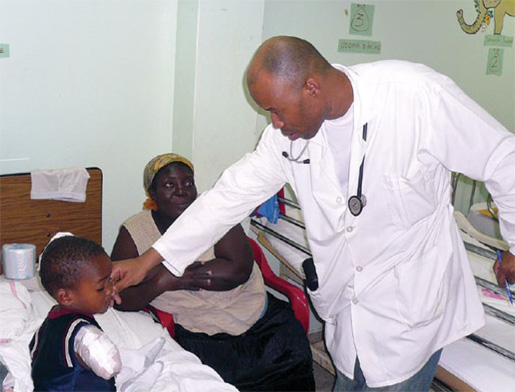Believes that healthcare in Haiti will only improve with a strong nursing infrastructure.
By Ela Schwartz
“People in Haiti are in need, but they are also ready to learn. They want things to change.”—Dr. Wladimir Louis-Charles, B.S.N. ’12Healing Haiti
Dr. Wladimir Louis-Charles, B.S.N. ’12, was not in Haiti on January 12, 2010, the day a magnitude-7 earthquake devastated his homeland. He was in the neighboring Dominican Republic, presenting his research at a bioethics conference. As soon as the news hit, he and other volunteers jumped into action, making the five-hour trek across the border and into Port-au-Prince. There they found unimaginable devastation: the capitol building collapsed, multistory concrete buildings pancaked to the ground, the streets filled with thousands of people in dire need of medical help.
 Dr. Wladimir Louis-Charles ’12 administers to a young amputee patient. |
Dr. Louis-Charles’ next 21 days consisted of nonstop triage on what he estimates to be 5,000 patients—setting broken bones so limbs could heal and amputating them when the damage was too severe, trying to treat spinal injuries and sometimes informing people that they would never walk again. By night, he helped unload trucks stocked with medical supplies, food and water and, later, wheelchairs and walkers.
While he credits the international rescue workers and doctors who came to the scene, Dr. Louis-Charles realized that relying on foreign aid organizations is akin to applying a Band-Aid to a lethal wound. “We don’t need people to come to Haiti and then leave,” he says. With student visas difficult to obtain and Haitian nurses likely to remain in the States after experiencing life here, the solution was to create a school in Haiti to train nurses to provide for the long-term healthcare needs of survivors as well as physical and occupational therapists to teach people how to regain independence and employment and psychologists to help them overcome their emotional trauma and find the strength to carry on.
“People in Haiti are in need, but they are also ready to learn. They want things to change,” he says.
Dr. Louis-Charles had wanted to pursue a career in medicine since his beloved grandfather had suffered from a brain aneurysm. “He said he was OK and not to call 911,” Dr. Louis-Charles says. “But he only lived another 15 days. I felt that perhaps we could have saved him if I’d known how to help.” Dr. Louis-Charles attended Nassau Community College and then went on to receive his medical degree from the Instituto Tecnológico de Santo Domingo. He planned a future as a practicing physician, but after the earthquake felt compelled to help his country. “It’s what my grandparents would have wanted me to do,” he says.
To be a nurse educator, he would need to become a nurse himself. When he told his sister Michaelle Louis-Charles, B.S.N. ’07, his goal, “She told me she’d received a brochure about the PATH program and said, ‘We have to go to Adelphi to speak to Dr. [Janet] Raman.’”
Dr. Louis-Charles became part of the first cohort of Adelphi’s Accelerated B.S. in Nursing program (formerly called PATH), which enables career changers to obtain a B.S.N. after 14 months of full-time study. Despite his extensive classroom and field experience, he found nursing to be a challenge. “As a physician, you’re trained to diagnose, but as a nurse, the emphasis is on clinical thinking and treating the whole person,” he says.
Always a strong student, Dr. Louis-Charles was disappointed with his grades. A couple of months into the program, he went to the office of Dr. Helen Ballestas, assistant professor of nursing. “I told her this wasn’t for me and started” to get teary-eyed. “She gave me a hug and encouraged me to continue. All the faculty here have been very encouraging.”
After his graduation in August 2012, Dr. Louis-Charles returned to a building in the north of Haiti where classes have been in session; in between studying, he managed to recruit 22 students for his school. “I translate course materials from English into French, Spanish and Creole and share the knowledge with them,” he says. “We will also teach them English and programs like PowerPoint. I want our nurses in Haiti to be at the same level as Americans and Europeans.” He hopes to bring Adelphi students and faculty back to Haiti to share their knowledge and gain valuable experience.
Assistant Professor Andrea McCrink, director of the accelerated program, agrees that healthcare in Haiti will only improve with a strong nursing infrastructure. Hardly a stranger to practicing in a developing country, she says she is exploring how the Adelphi School of Nursing can participate in Dr. Louis-Charles’ project. “Wladimir has a sense of dedication about him,” she says. “He has a mission. He has had a journey and he has struggled at times. And we are so very proud of him.”
For further information, please contact:
Todd Wilson
Strategic Communications Director
p – 516.237.8634
e – twilson@adelphi.edu